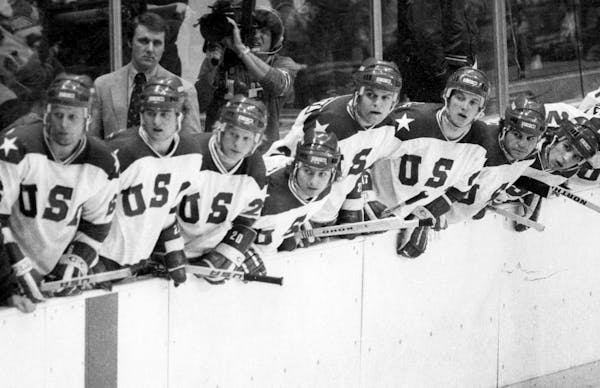The United States had defeated the Soviet Union in a significant Olympic hockey upset, 4-3, on Feb. 22, 1980. This was reported to have caused quite a stir in the village of Lake Placid, N.Y., the location of the contest.
That was also the case here in Minnesota, home to 12 of the 20 players, as well as creating a patriotic frenzy even in the hockey-barren lands of this country that existed then.
Dr. George Nagobads, the team doctor, had traveled across North America and Europe with that squad for months, and he was standing next to coach Herb Brooks on the bench throughout the upset.
As cowboy-hat wearing masses sucked the alcohol out of Lake Placid, serenading one another with the two great anthems of the time, "The Star-Spangled Banner'' and "Luckenbach, Texas,'' Nagobads was asked this week if he got in on the partying.
Nagobads leaned forward at a table where lunch would soon appear and he said: "When everyone left the arena, I went to my room to fill out the injury reports. We must record the condition of the players after each game.
"There was a knock on my door. I opened it and there were three players from the Russian team, including Helmut Balderis. He's from Latvia, as am I, and I had known 'Baldy' for a long time.
"The players were saying in Russian, 'Doc, Doc, we need your help.'''
When Nagobads is telling a tale, he provides not only the details but the facial expressions that were likely his at the time.
Thus, 41 years later, he gave a surprised look and said: "I asked, 'Why are you not seeing your team doctors?'
"And Baldy said [in Russian], 'No, Doc, we need you to come with us to the store where they are selling moon boots. Our wives want us to get these moon boots, and people there can't understand us. And there is only a half-hour until the store closes.'''
As he did in so many emergencies, the Hockey Doc came through — taking a break from important paperwork to make sure the Soviet wives got their moon boots.
Nagobads speaks five languages: English, Latvian, Russian, German and French. This was not his lone Russian conversation on that memorable night. There was a brief one with Vladimir Petrov, a veteran on the Soviet team.
"Herb said to me the day before the game, "We can win this game, if we can keep our legs fresh and skate with them,'" Nagobads said.
"His strategy was to keep our shifts very short. He didn't want any shifts to last longer than 40 seconds; preferably, 35 or 30.''
Nagobads was assigned to stand next to Brooks with a stopwatch and give him a count … "20 seconds, 25, now 30!,'' as Herbie waited to pull his quick trigger for a change.
"Petrov had three faceoffs on a shift and, each time, there was a different U.S. player,'' Nagobads said. "He looked at me and said, 'Doc, chto chert vozmi proishodite,' which was, 'Doc, what the hell is going on?' in Russian.
"I said back to him in Russian, 'Vladimir, you better ask your coach.'"
Nagobads was the featured attraction in mid-October for a lunch at Tavern 23 in Edina that included Lou Nanne (No. 23), Murray Williamson and Rob McClanahan.
He will be turning 100 on Nov. 18. There has been a "Whereas'' document submitted to Gov. Tim Walz's office, asking for 11-18-2021 to be declared Dr. George Nagobads Day in Minnesota.
This would seem like an open net, when you consider Nagobads' longevity in medicine and hockey, and the level of admiration earned in both — in Minnesota, nationally and internationally.
Visvaldis George Nagobads was born in 1921 in the Latvian capital of Riga. His parents were strong believers of education and the arts.
"I was at a dance in 1940, when word spread that the Russians had come across the border in force,'' Nagobads said. "My father had a very important job in local schools. He was removed and I was not admitted to the university, even with excellent test scores.
"The Germans came in a year later and the Russians ran like rabbits. When the Russians came back in 1944, that's when we left Latvia.
"We considered Germany safer for us than what the Russians would bring to Latvia. We did not learn of Nazi horrors until much later.''
Nagobads received a medical degree from the University of Tubingen in the Frankfurt area. He was working for an international refugee group in France fighting tuberculosis when he learned of medical opportunities in Minnesota.
George and his wife-to-be, Velta, received their papers and immigrated to Minnesota in 1951. She died in 2005. George has visited the grave site regularly, even though he was robbed and beaten there in 2015.
He will show you the scar on his head if not wearing his traditional fedora for inside hockey rinks.
Nagobads was working in the health service at the University of Minnesota when Dr. Ruth Boynton, a U of M medical legend, said to him in 1958:
"The hockey team needs a doctor to work with them. Do you have any interest?'''
Nagobads said enthusiastically: "I played hockey in Latvia. I love hockey. I want to do this.''
Nagobads went to what was then the smaller hockey portion of Williams Arena, met with coach John Mariucci, started his journey as the Hockey Doc: 34 years with the Gophers, five Olympic teams, 25 other U.S. international teams.
Williamson, now 87 but still at Doc's call, was coaching the 1972 Olympic team and informed at the Denver airport that another physician would the team doctor in Sapporo, Japan.
"I said, 'My team doctor is Doc Nagobads,'" Williamson said. "We aren't getting on this plane without him.''
The Hockey Doc smiled and said: "They named me a trainer or something, but I was there with Murray as his team won the silver medal.''
Nanne smiled across the table and said: "You know what Doc gets every gold medal for? Stitching up cuts. He put hundreds in me. If one of our kids got cut on the playground, we called Doc. Greatest suture man of all time.''
McClanahan threw in a tribute to Nagobads as a middle man for players and the mercurial Brooks.
Doc nodded and said: "There is our unsung hero of Lake Placid. We had to beat Finland two days after the Russian game, or we not only don't win gold, we don't win a medal.
"And who scored the winning goal, who broke the 2-2 tie with Finland? Right there. Rob McClanahan.''
To which Doc Nagobads, about to turn 100, still sharp beyond belief, raised a glass.
It was water, but it came from the Hockey Doc, admired and relied upon by untold numbers for six decades, even Russians on a night they had lost miraculously and yet needed moon boots.
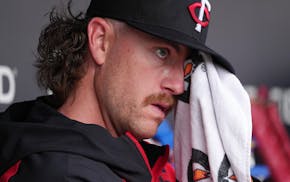
Reusse: Once-formidable Twins starting rotation vulnerable without López
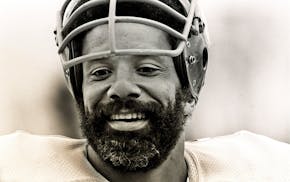
Reusse: Country boy Jim Marshall never lost his lust for life
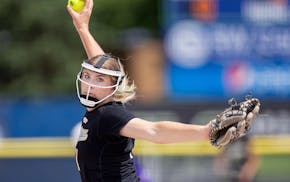
Reusse: As Caswell Park does itself proud, a hometown team runs hard into a challenge
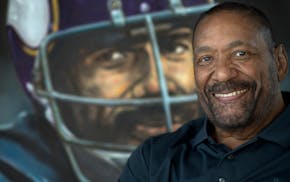
Reusse: Jim Marshall belonged to us, and Minnesota loved him for it


